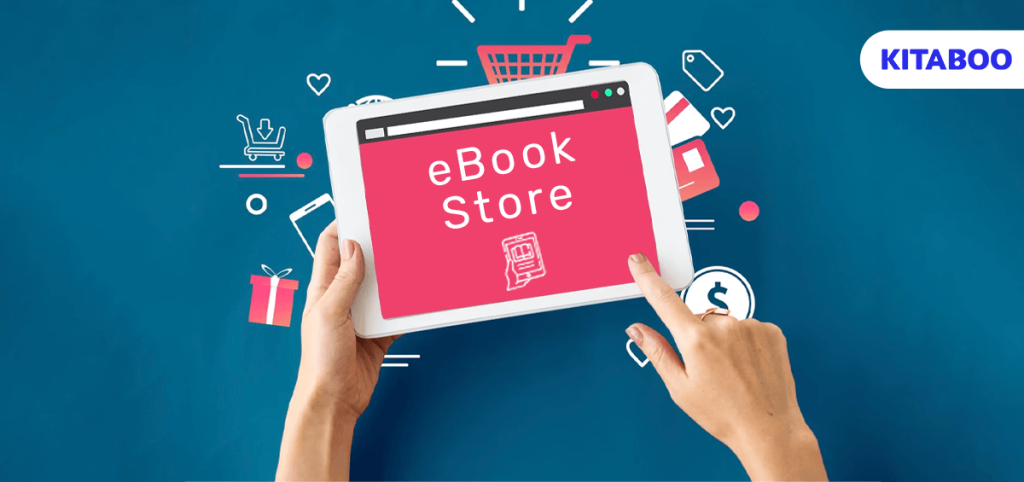
Top 5 eBook Store Platforms to Consider for Your Business (2024)
eBooks have been growing in popularity, with the revenue in the eBook industry estimated to reach USD 14.16 bn in 2024. With so much choice, standing out against the crowd becomes essential. Choosing the right eBook store for publishing can be the perfect way to increase your viewership and scale your business.
Let’s walk through our list of the five best eBook store platforms and explore their key features and benefits.
Table of Content
I. What is an eBook Store Platform?
II. What are the Benefits of Having an eBook Store Platform?
III. Top 5 eBook Store Platforms
IV. Takeaway
What is an eBook Store Platform?
An eBook store is an online bookstore where you can download eBooks onto reading devices. A publisher has two options for selling eBooks: open their own eBook shop using platforms like KITABOO or participate in affiliate programs run by online bookstores like Amazon, Apple iBooks, and Google Books.
Given the minimal initial expenses, opening an eBook store may seem like a feasible business venture. However, it comes with its own set of challenges:
- You must specialize in branding and marketing to stand out in a crowded e-publishing industry.
- Managing inventory, promotions, distribution, and customer service can become tedious and time-consuming.
However, if you want your eBooks to have a global reach without worrying about taking on too much on your own, you can opt for well-established eBook store platforms that can ease your burden.
What are the Benefits of Considering an eBook Store Platform?
Listing your eBooks on popular platforms or leveraging the tools of eBook store services can help you unlock better revenue generation in a lucrative market.
Here are a few key benefits of eBook store platforms:
1. Lower Cost of Production
Publishers are no longer required to print countless copies, saving money on inventory, printing, and storage. The same eBook can be downloaded from the store more than once after publication and from anywhere across the globe. Using an eBook store saves you the cost of warehousing, shipping, and damaged books.
Moreover, suppose you want to rectify errors or upgrade existing content by adding multimedia. In that case, you can easily make the required changes to your eBooks without worrying about large-scale expenses.
2. Increased Reach
Publishers can target a larger, global audience by using eBook store platforms. Starting your site to sell eBooks offers greater customization and autonomy over the process. However, there are a few things to keep in mind:
- With platforms like KITABOO, the webstore engine handles all your distribution needs, from hosting eBooks to searching titles and managing categories, prices, and promotions.
- Hosting platforms like Amazon’s Kindle enable you to tap into an established audience base to increase the reach of your eBook.
- Publishers can customize their marketing to target niche audiences worldwide by integrating social media and their websites into eBook store platforms.
Top 5 eBook Store Platforms
The increased demand for eBooks post-pandemic has given this industry a surge in revenue generation. If you are a publisher looking for a reputed eBook store platform to sell or list your eBooks with maximum profit, here are the top five eBook stores to consider.
1. KITABOO
KITABOO is a leading eBook store platform. You can use its eCommerce engine to manage your eBook distribution requirements like storing eBooks, searching titles, controlling categories, costs, and marketing.
Features
- Customized Webstore: KITABOO enables businesses and institutions to build a custom-branded eBook store with their logo.
- Easy Conversion: You can quickly convert your eBook into ePub format.
- Secure DRM: It secures your eBooks with DRM, preventing misuse or illegal circulation.
- Integration with your payment gateway: KITABOO allows users to purchase eBooks from your custom branded web store and read them using branded apps with an API that integrates with any payment gateway.
- Mobile optimized: 54% of eBook buyers read on their mobile devices. KITABOO offers a quick and easy solution to create your eStore with a seamless digital multi-device experience for smartphones, tablets, or PCs.
Pros
- With KITABOO’s comprehensive social media integration, you can easily link your social network profiles to your online store, making it simple for customers to purchase your products there.
- Customizable to your business’s needs.
- Intuitive interface, enabling anyone to publish eBooks online!
Cons
- It might not be viable for single eBook conversions.
2. Amazon
Amazon’s Kindle store is one of the largest online eBook stores.
Features
- Access to Amazon’s built-in marketing tools to enhance your eBook’s reach.
- Amazon’s print-on-demand feature means you can save on storing and printing costs.
- The platform’s intuitive interface is perfect for anyone publishing their content as an eBook.
Pros
- The vast range of eBooks enables a huge audience readership and draws consumers back repeatedly.
Cons
- Royalties can vary between 35% to 70%, depending on the book’s price, meaning lower margins.
3. Apple iBooks
This free self-publishing eBook store for iBook-formatted eBooks might not boast the same customer base as Amazon KDP, but it is still popular compared to the other stores.
Features
- Access to detailed sales reports and analytics.
- You can become an affiliate to drive sales through your own links to get an additional 7% of the sale price.
- Access to promotional codes to drive engagement.
Pros
- Apple iBooks offers you an amazing 70% royalty for your eBook sales.
Cons
- Readers will require an Apple account to access books via the platform, limiting your work’s reach.
4. Lulu
Lulu is a US-based publishing company that provides publishers with varied services to publish and sell printed and electronic books.
Features
- Free ePUB conversion for Word documents.
- You can select multiple retailers but receive lower royalties (40% to 50%).
- Access to advertising services, such as promotion and website design, for an additional fee.
Pros
- Lulu offers authors 75% of the royalties if you publish only with them.
Cons
- Before it can be published, your eBook must pass a quality assurance exam.
5. Barnes & Noble Press
With almost 600 retail locations, Barnes and Noble is the biggest physical bookshop in the United States and one of the finest alternatives to Amazon for online book purchases. The firm also produces the Nook e-reader.
Features
- You can set pre-orders for your eBooks.
- Users of the app can find your eBooks organically on the platform.
- You can easily monitor eBook sales by logging onto their intuitive dashboard.
- You can profit from a significant royalty along with additional marketing.
Pros
- B&N is a top-performing eBook platform with a strong customer base, which provides your eBooks with a wider reach.
Cons
- Barnes and Noble eBooks are available in the EPUB format, so Kindle devices cannot read them.
- While they provide resources to market your eBook, you will still need to do it independently.
Takeaway
Publishing books has been dramatically democratized via eBook stores. Further, your eBook can reach global audiences far quicker than traditional techniques. Publishers are now leveraging the advanced features of eBook store platforms as the global user penetration rate of eBooks is expected to hit 14.1% by 2027.
Contact our expert team for advice if you want to create a custom eBook store for your business.
Suggested Reads:
- Designing eBooks For Different Devices
- eBook Library
- Effective Strategies to Prevent eBook Sharing
- MOBI to ePUB Conversion
- The Benefits of Using Digital Textbooks in Education
- How to Enhance the Digital Publishing Experience
- Best eBook Hosting Platforms for Digital Publishing
- Designing eBooks For Different Devices
- Best eBook Creation Softwares
Discover how a mobile-first training platform can help your organization.
KITABOO is a cloud-based platform to create, deliver & track mobile-first interactive training content.



